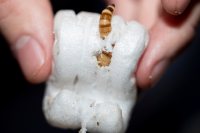
Bates called exemplary in 'green campus' survey
Its environmental policies and practices make Bates College a leader among American universities and colleges in a survey that the National Wildlife Federation (NWF) released in October.
The survey, titled “The State of the Campus Environment: A National Report Card on Environmental Performance and Sustainability,” is the first large-scale assessment of “green” practices at U.S. institutions of higher learning. The NWF set out to measure environmental performance across a broad spectrum of issues, including institutional goals and policies, integration into the curriculum, energy use, purchasing and recycling.
In 17 areas the survey report listed “leading schools,” those considered exemplary in the national context. Bates College was designated a “leading school” in four: environmental goal-setting and environmental policies, energy conservation, setting goals and written policies to buy organic foods, and recycling 60 percent or more of total municipal waste generated.
Bates College’s long commitment to sustainable environmental policies gained momentum during the past decade, particularly with the hiring of an environmental coordinator and the formation of a campus-wide Environmental Confederation, whose recommendations inform not only specific environmental practices but the college’s overall strategic planning.
An interdisciplinary environmental studies major was instituted at Bates in 1997. The college’s dining services department received a national award for sustainable practices in 1999, and was cited in Greening the Ivory Tower (MIT Press, 1998), Sarah Hammond Creighton’s book on best environmental practices among colleges, universities and other institutions.
Working with the research firm Princeton Survey Research Associates, the NWF sent surveys to 3,900 of the 4,100 colleges and universities in the United States. Different surveys were designed for the president, provost and chief of facilities at each school. Nearly 900 institutions responded.
In Maine, besides Bates, the 10 responding schools included Colby College, the College of the Atlantic, the University of New England and campuses of the state university and technical college systems. The other “leading schools” in Maine were the College of the Atlantic and the University of Maine at Augusta, each with two listings.
According to the NWF’s “report card,” the national academic establishment as a whole earned A’s for energy and water conservation. Performance was more disappointing in promoting environmental literacy and sustainable transportation practices, both of which were given a D.
Of the presidents’ offices responding, 64 percent agreed that sound environmental principles harmonized with the values espoused by their institutions. Nearly half agreed that pro-environmental policies were valuable to good public relations.
The National Wildlife Federation undertook the survey as part of its Campus Ecology program, an ongoing effort to enhance the role that colleges and universities play in achieving environmental sustainability. The federation intends to conduct the survey every three years.
For comments from the NWF, please contact Julian Keniry, manager of the NWF Campus Ecology Program, at 703-438-6322 or this keniry@nwf.org; or Kathy Cacciola, NWF campus ecology coordinator, at 703-438-6318 or this cacciola@nwf.org.




